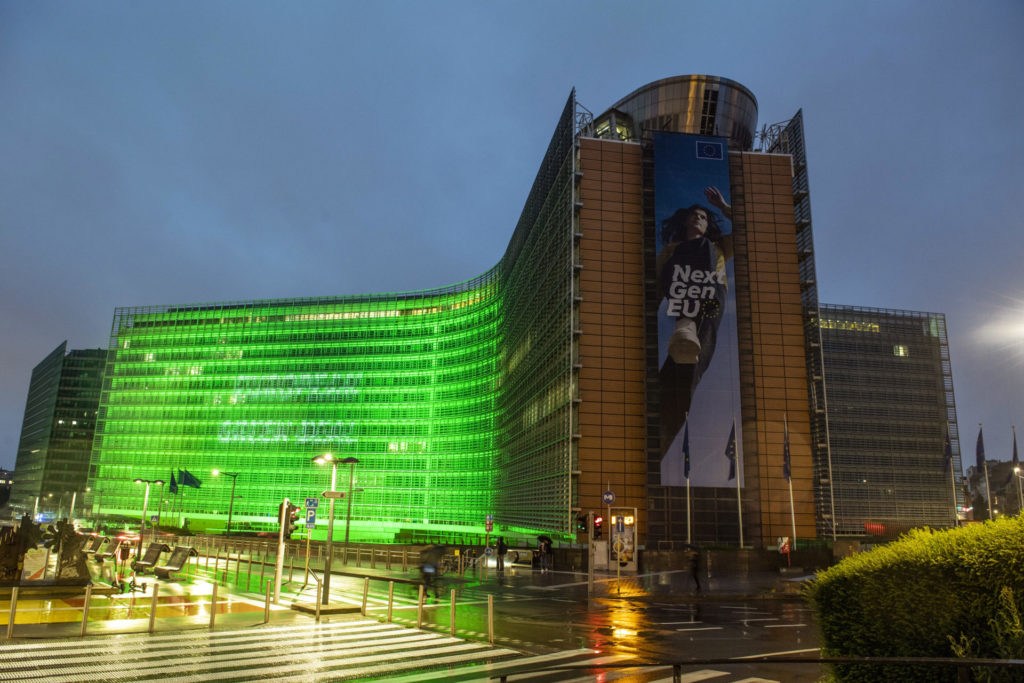BRUSSELS BEHIND THE SCENES
Weekly analysis and untold stories
With SAM MORGAN
Brussels' bid to make Poland and Hungary behave
Guilty by association
The European Union has a lot of admirable ambitions and goals, but the partners it works with to try and make its policies a reality can often raise eyebrows. This week provided yet another example of that.
“What’s your trick?” ask some footballing megastars in a new climate action campaign from the European Commission, before showing off some fancy footwork that switches off lamps, turns down the central heating and closes an open fridge.
The video is part of an agreement with European football governing body UEFA, which will see it played in stadiums at half-time for an entire season. The idea is to reach people beyond the Brussels bubble and away from the all-too toxic world of politics.
What is clearly a well-meaning attempt to have a bit of fun with the issue and hopefully convince more people of the necessity of climate action has, however, drawn immediate criticism.
BRUSSELS BEHIND THE SCENES is a weekly newsletter which brings the untold stories about the characters driving the policies affecting our lives. Analysis not found anywhere else, The Brussels Times’ Sam Morgan helps you make sense of what is happening in Brussels. If you want to receive Brussels behind the scenes straight to your inbox every week, subscribe to the newsletter here.
Aside from the argument that climate action should be more nuanced that performing "tricks" and that personal accountability can only go so far — there is a great debate to be had on both sides of that particular aspect — it is the Commission's choice of partner that has provoked ire.
UEFA has sponsorship deals with hundreds of companies, one look at the advertising boards at the side of football pitches or a few minutes of ad breaks during a Champion’s League match shows that. Sport is money, money is sport.
Some are involved in business activities that rather go against some of the EU’s admirable goals. In the climate video’s case, it is hard to square legendary Italian goalkeeper Gianluigi Buffon’s fridge-closing footwork with UEFA’s commercial partnership with Gazprom.
The state-owned Russian gas firm is a difficult bed-fellow for this Green Deal-led Commission, given its fossil energy source’s undeniable contribution to climate change and the current power price crunch that is squeezing Europe.
Gazprom is behind the Nord Stream 2 pipeline, which is due to go live later this year, and is already responsible for some of the biggest methane leaks in recent years. A big problem, given that methane is a far more potent, albeit shorter lasting, greenhouse gas than CO2.
The firm also this week cut back on gas shipments to Moldova, forcing the government there to declare a state of emergency. Despite being one of the poorest countries in Europe, it was not because of a failure to pay the bills, Moldova just got caught up in geopolitics.
Other big name UEFA sponsors include Volkswagen, which is directly tied to the ‘Dieselgate’ emissions test cheating scandal, and state-owned airline Qatar Airways, which hails from a country that regularly fails to meet minimum human rights standards. FIFA has been heavily criticised for awarding next year's World Cup to Qatar too.
Unfortunately, the EU’s green fingertips have indirectly been stained with this indelible ink and it is not the first time Brussels has been guilty by association. The migration deal with Turkey and the Commission’s dealings with investment group BlackRock are also red marks against the EU’s good name.
Influence Map, a climate think tank, questioned the football partnership too, insisting “it is difficult to see how UEFA’s commitment to raising awareness about the climate emergency using football can be reconciled with sponsorship from one of the biggest CO2 emitters in history.”
“If every trick counts, then UEFA should probably review its decision to partner with Gazprom,” the group adds. Herein lies the silver lining of this particular episode. Perhaps.
EU decision-making is all about exerting soft power. The bloc, for example, is currently only responsible for a small fraction of global emissions, so wants to use the Green Deal to spark action among big emitters.
The evidence shows that it is starting to influence places like China and India, either by demonstrating the potential economic benefits of a green economy or using access to the EU’s lucrative internal market as a bargaining chip.
Maybe this partnership with UEFA will have more of an effect than simply convincing football fans not to leave the fridge open, instead shining a light on corporate greenwashing and raising the pressure on sponsorship deals.
After all, if the Commission were to snub every company or association that has some link to less-than-reputable third parties, there would not be many people left on its Christmas card list. Better to change the way business is done from the inside, one could argue.
Now that would be a ‘trick’ worth seeing.
BRUSSELS BEHIND THE SCENES is a weekly newsletter which brings the untold stories about the characters driving the policies affecting our lives. Analysis not found anywhere else, The Brussels Times’ Sam Morgan helps you make sense of what is happening in Brussels. If you want to receive Brussels behind the scenes straight to your inbox every week, subscribe to the newsletter here.

